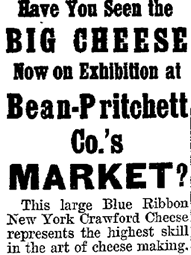The most important person.
The big cheese
What's the meaning of the phrase 'Big cheese'?
What's the origin of the phrase 'Big cheese'?
In earlier times the cheese didn’t have to be big – ‘the cheese’ alone was a synonym for quality. We now use cheesy to describe anything second-rate, artificial or even smelly. Going back to the 19th century the meaning was just the opposite. ‘Cheese’ or ‘cheesy’ is listed in John Camden Hotten’s A Dictionary of Modern Slang, Cant and Vulgar Words, 1863 as:
“Anything good, first-rate in quality, genuine, pleasant or advantageous”
Hotten also mentions that ‘chiz’ is used in the Hindostanee and Persian languages – meaning ‘thing’. He also records ‘that’s the Stilton’ as meaning the same as ‘that’s the cheese’.
Early in the 20th century the cheese crossed the Atlantic to the USA, and there it got big. The first reference there to ‘big cheese’ meaning wealth or fame comes from ‘O. Henry’ (William Sydney Porter), in Unprofessional Servant, 1910:
“Del had crawled from some Tenth Avenue basement like a lean rat and had bitten his way into the Big Cheese… He had danced his way into fame in sixteen minutes.”
‘Big cheese’ in the ‘important person’ sense comes a little later. The earliest I’ve found is from The Olean Evening Times, June 1922, (although there will undoubtedly be other references from around that date), in a piece ‘In honour of the Mayor of Olean’:
Foley, say there, Foley, with your hair of reddish hue
And your Irish smile, begorra!
Blarneyed them into meeting you.
The big mayor of Olean fair,
You’re the big cheese on the scene.
Foley, tell us, Foley, is your city song
The Wearin of the Green?
It is quite likely that these American attributions were influenced by the many actual ‘Big Cheeses’ that were produced for display in the early 1900s in the USA – some of which were vast. There are dozens of examples of references to such in US newspapers of the time; for example, this advertisement from the Decatur Daily Review, November 1903 – in an excitable piece headed ‘Don’t Forget To Come And See The Big Cheese’.
Ironically, given that in the USA ‘big cheese’ was used with a similar meaning to what in the UK was ‘cheese’ alone, the USA was the country that also coined the term ‘the cheese stands alone’. This derived from a children’s singing game in which the last player – ‘the cheese’ is circled by the others.
The farmer in the dell, the farmer in the dell,
Hi-ho, the derry-o, the farmer in the dell.
The farmer takes a wife, the farmer takes a wife,
Hi-ho, the derry-o, the farmer takes a wife.
The wife takes a child, the wife takes a child,
Hi-ho, the derry-o, the wife takes a child.
The child takes a nurse, the child takes a nurse,
Hi-ho, the derry-o, the child takes a nurse.
The nurse takes a cow, the nurse takes a cow,
Hi-ho, the derry-o, the nurse takes a cow.
The cow takes a dog, the cow takes a dog,
Hi-ho, the derry-o, the cow takes a dog.
The dog takes a cat, the dog takes a cat,
Hi-ho, the derry-o, the dog takes a cat.
The cat takes a rat, the cat takes a rat,
Hi-ho, the derry-o, the cat takes a rat.
The rat takes the cheese, the rat takes the cheese,
Hi-ho, the derry-o, the rat takes the cheese.
The cheese stands alone, the cheese stands alone,
Hi-ho, the derry-o, the cheese stands alone.
The history of “The big cheese” in printed materials
Trend of the big cheese in printed material over time
Related phrases and meanings
Browse more Phrases
About the Author

Phrases & Meanings
A-Z
A B C D E F G H I J K L M N O P Q R S T UV W XYZ
Categories
American Animals Australian Bible Body Colour Conflict Death Devil Dogs Emotions Euphemism Family Fashion Food French Horses ‘Jack’ Luck Money Military Music Names Nature Nautical Numbers Politics Religion Shakespeare Stupidity Entertainment Weather Women Work
How did we do?
Have you spotted something that needs updated on this page? We review all feedback we receive to ensure that we provide the most accurate and up to date information on phrases.
